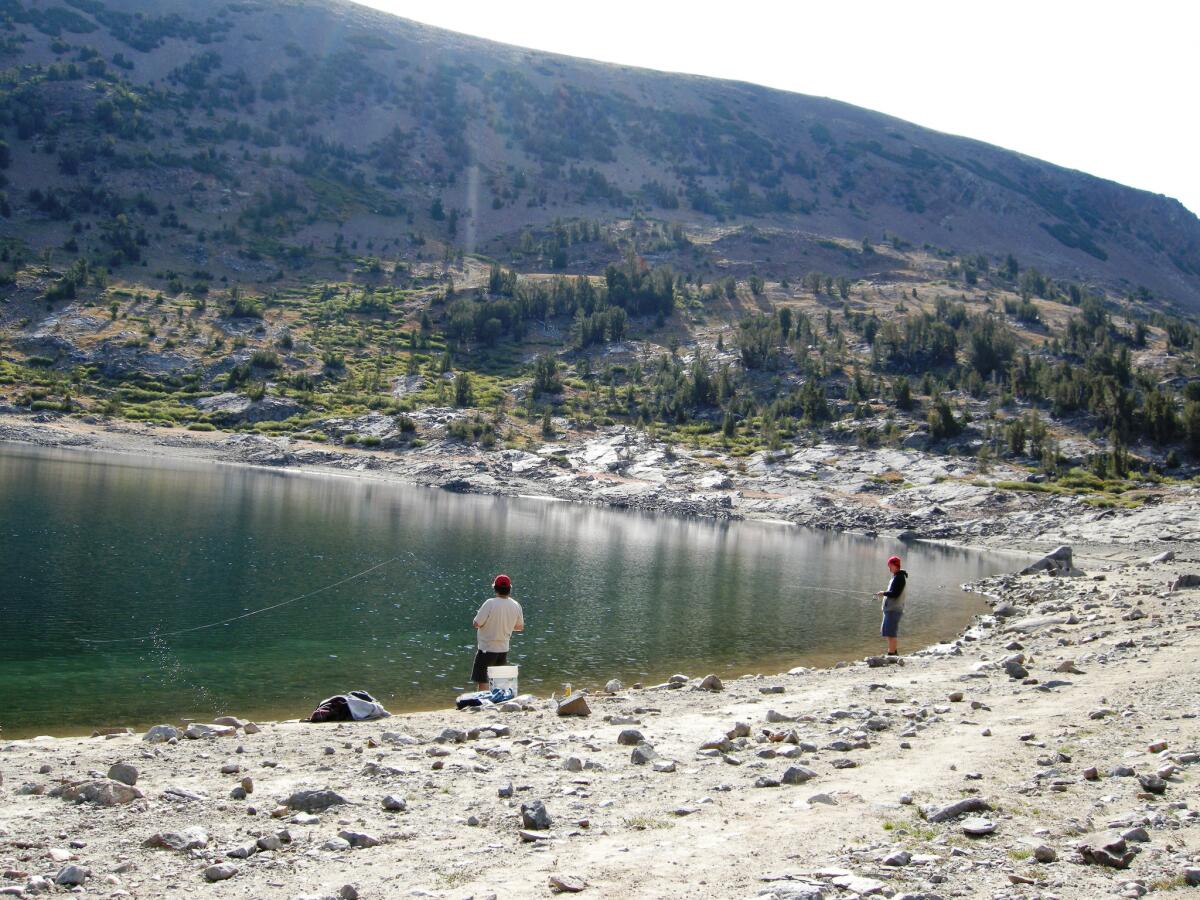Hunters angry over changes at state Fish and Wildlife agency say panel no longer represents them

Two anglers stake their spots on the banks of Saddlebag Lake. Some California anglers and hunters are upset about what they believe is a lack of representation on the state Fish and Wildlife Commission.
The number of Californians who hunt has dwindled to less than 1% of the population, but some who still carry rifles outdoors complain the state commission overseeing them has become too cozy with the animal rights movement.
Now Gov. Jerry Brown is facing pressure from outdoor enthusiasts to fill two vacancies on the five-person Fish and Game Commission with people who understand hunters and anglers and their role in conservation.
“The commission has shifted from a philosophy of conservation to one of preservation, meaning its direction has gone to where fishing and hunting are more and more limited and very difficult,” said Marko Mlikotin, executive director of the California Sportfishing League.
The shift in emphasis at the commission has also frustrated some veterans of the agency, including Jim Kellogg, an avid hunter who resigned from the commission in December after 14 years on the panel. The commission’s executive director, Sonke Mastrup, and department deputy director Dan Yparraguirre also left their positions about the same time, with Mastrup taking another job in the department. Both were seen as sympathetic to the outdoors community.
Kellogg said that he used to win most battles on the panel for hunters, but in recent years lost on big preservation issues.
The animal rights people who don’t favor hunting and fishing have more horsepower than they did before.
— Jim Kellogg, avid hunter who resigned from the commission in December
“I’m not willing to accept the changing world,” he said. “The animal rights people who don’t favor hunting and fishing have more horsepower than they did before.”
Kellogg acknowledges that the California of his youth does not exist any more. Forty years ago, 608,455 people had California hunting licenses, when the state’s population was 21.5 million. Last year, 272,229 hunting licenses were issued though the state’s population is 39 million.
At the same time, more Californians live in urbanized areas. And the state that once elected Republican Ronald Reagan has seen a leftward shift in its politics, with the number of environmental and animal rights activists growing.
The commission is ground zero for the battling interests because it sets policy and regulations and can decide which species to protect by labeling them endangered.
Bill Gaines, a lobbyist for several outdoors groups, said the commission long ago was an “old boys club where all they talked about was hunting and fishing.” Former Commissioner Michael Sutton said hunters and anglers used to dominate the board because their license fees paid for all state wildlife management. But their dwindling numbers mean they no longer cover most of the state agency’s costs, he said.
Jennifer Fearing, a lobbyist for the Humane Society of the United States, said the shift on the board began after the 2003 election of Gov. Arnold Schwarzenegger, who appointed commissioners who supported efforts to protect marine life off the California coast.
Brown reappointed Kellogg but has also continued to maintain what Fearing calls a “conservation majority” to the board.
“The premise that I would disagree with is that somehow this has become a forum where animal rights folks snap their fingers and get what they want,” Fearing said. “That’s absurd.”
She said that for years in the past the commission favored hunters and anglers and was not receptive to the viewpoints of animal rights activists.
“I think it has become a forum that frankly is more professional and more reflective of the views of all the Californians who care about wildlife,” she said.
The three Brown-appointed commissioners now on the panel are Anthony Williams of Huntington Beach, director of government relations at Boeing Co.; Eric Sklar of St. Helena, a partner in Cs2 Wines; and Jacque Hostler-Carmesin of McKinleyville, who is chief executive at Cher Ae Heights Indian Community of the Trinidad Rancheria. Sklar is the only hunter.
Outdoors enthusiasts point to a string of decisions by the state that angered them, including banning lead ammunition, prohibiting the trapping of bobcats, restricting the use of hounds in hunting and listing wolves as a protected endangered species, which hunters worried would mean the animals would kill more deer and other game.
Mlikotin’s complaints include decisions to make large areas of the state’s coastal waters off-limits to recreational fishermen, and a reduction in the amount and size of trout released into California lakes.
Jordan Traverso, a spokesman for the state agency, explained the cuts by saying revenue in the fund for planting trout “have been static over the last several years but hatchery operating expenses have increased dramatically.”
Activists say the shifting role of the commission was signaled in 2012 when the Legislature and governor changed the name of the state Department of Fish and Game to the Department of Fish and Wildlife. Some lawmakers argued that the word “game” was a hunting term no longer descriptive of the agency’s changing role to protect animals.
Hunters were furious when the commission voted in 2014 to list gray wolves as endangered despite a recommendation by staff that it was not justified. But the clashing of interests came to a head in August when the commission voted 3-2 to ban all commercial bobcat trapping in the state though the department’s director recommended against it on the grounds there was no evidence the species was endangered.
Jack Baylis, then-president of the panel, supported the ban, joining a majority bloc that argued the state lacked the science to support continued trapping. The vote was blasted by outdoor activists including John Carlson Jr., president of the California Waterfowl Assn.
“We didn’t think Baylis was as balanced on the issues as he could have been,” said Carlson, who was executive director of the commission before 2010. “He went against some of the science-based recommendations of the department.”
The ban grew out of a law approved by the Legislature that prohibited bobcat trapping around Joshua Tree National Park. Lawmakers asked the commission to examine whether that law should be expanded. Fearing, who supported the statewide ban, said the bobcat trapping program was not financially self-sufficient as required by state law. The legislation was opposed by the California Trappers Assn.
George Kammerer, an attorney for the trappers, told The Times that at the end of the December commission meeting, Baylis wrote a check for the Fund For Animals while at the dais and handed it to Fearing in front of him.
“I was absolutely floored to watch Baylis write that check out sitting on the dais where five minutes earlier he was conducting the commission meeting,” Kammerer said. “I’ve never seen a more blatant conflict of interest.”
Baylis, who heads a construction management firm, did not return calls for comment. He left the commission when his term expired two months ago. Fearing said she had provided commissioners with a tour of Fund for Animals facilities, and Baylis volunteered his donation after being impressed by what he saw.
Some members of outdoors groups say they had an even greater concern with former Commissioner Sutton, who stepped down as commission president when his term expired in July.
Hunting groups previously filed multiple complaints with authorities alleging Sutton had a conflict of interest. The alleged conflict arose in 2013, when the Legislature acted over hunters’ objections to put the commission in charge of researching and drafting regulations to ban lead ammunition in hunting. Sutton led the commission in implementing the change.
At the time, Sutton was vice president of the National Audubon Society, earning more than $100,000 a year. The society was a sponsor of the legislation seeking the lead ammunition ban.
Emails obtained by The Times indicate that Sutton lobbied Oregon Gov. John Kitzhaber as an Audubon Society representative in 2013 to urge Brown to sign the bill implementing the initial ban on lead bullets. Sutton wrote to Kitzhaber, saying Brown’s signing the lead ammo bill was “a huge victory for conservation and I want to thank you for your willingness to weigh in with Gov. Brown to persuade him to sign the bill.”
He said the lead ban was “a heavier lift” than one a few years earlier banning the killing of sharks for their fins.
“The well organized and funded but misguided opposition of the gun lobby makes this victory all the more significant,” Sutton wrote to Kitzhaber on Oct. 11, 2013.
In an email to Michael Finley, president of the Turner Foundation, Sutton said one of the other commissioners called Brown urging him to veto “our bill” because some thought it would be bad for hunters. Sutton wrote that he had “donors” calling Brown. “So if Kitzhaber hasn’t yet reached Brown, it’s not too late,” Sutton said in the email. “Tell him to keep trying.”
Ashlee Titus, an attorney for the foundation, wrote to California Atty. Gen. Kamala D. Harris and Brown to say Sutton needed to recuse himself from involvement in the lead ammunition rules. Sutton’s participation, she wrote, “will undermine the public’s confidence in the Commission’s impartiality and fairness in the regulatory process.”
Harris’ office wrote back to say that Sutton did not have a financial interest that would pose a conflict.
Sutton has also denied he had a financial conflict of interest, adding that lawmakers made the same finding during his state Senate confirmation hearing.
“I kept my public service and my day job separate,” he said.
Hunting and angling activists including Gaines say they are now urging Brown to fill the two vacancies with people who are not biased against their interests.
“He should give strong consideration to people who have an understanding of our hunting and fishing heritage, and the positive things it does for California’s economy and the significant positive things it does for habitat,” Gaines said.
Follow @mcgreevy99 on Twitter
ALSO
Gray wolf gains endangered species protections in California
Newhall Land’s gift of trucks to Fish and Wildlife raises concerns
More to Read
Get the L.A. Times Politics newsletter
Deeply reported insights into legislation, politics and policy from Sacramento, Washington and beyond. In your inbox three times per week.
You may occasionally receive promotional content from the Los Angeles Times.











